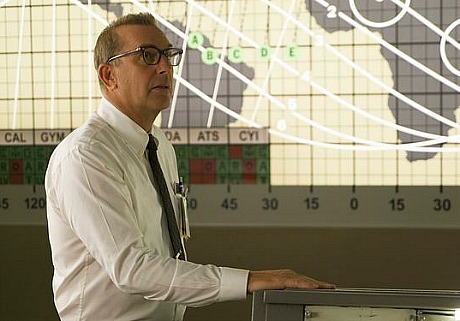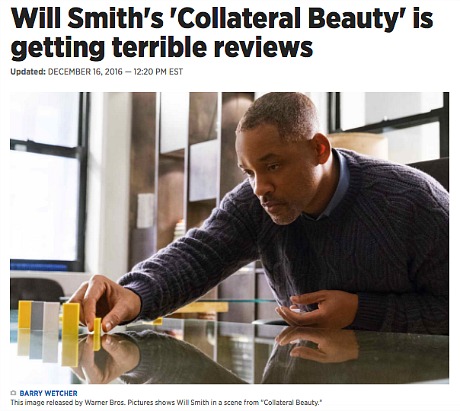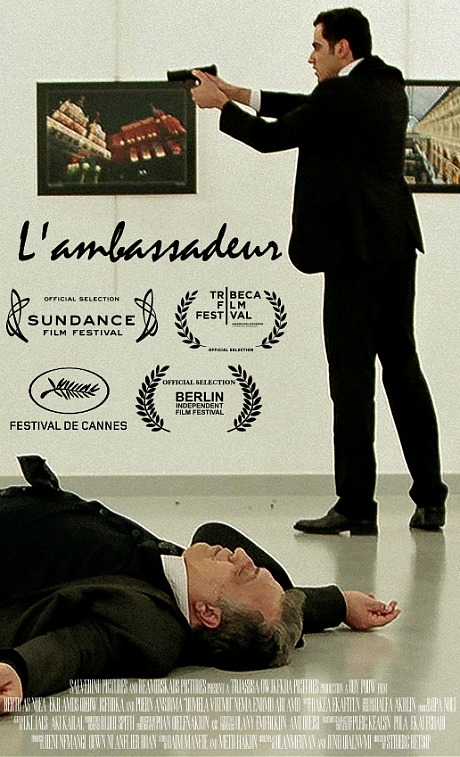The great-grandson of Harry Callahan reduced to a fucking cartoon…terrific.
Daily
Night Phantom
“I have stolen more quotes and thoughts and purely elegant little starbursts of writing from The Book of Revelation than anything else in the English language…not because I am a Biblical scholar or because of any religious faith, but because I love the wild power of the language and the purity of the madness that governs it, and makes it music.
“To live where the real wind blows…to sleep late, have fun, get wild, drink whiskey and drive fast on empty streets with nothing in mind except falling in love and not getting arrested…let the good times roll.” — from Hunter S. Thompson‘s Generation of Swine (’88).
Hit Me With Your Diversity Stick
Last Friday CNN.com’s Lewis Beale posted a piece about what a cool thing it is that Rogue One‘s ragtag heroes are composed of varied ethnic flavors. Asian, Hispanic, African-American and Pakistani guys in addition to the three whiteys (Felicity Jones, Ben Mendehlson, Mads Mikelsen), he meant.
“Fifty years after Star Trek launched a multiracial and multicultural crew into outer space, the Star Wars franchise has finally joined the diversity universe,” Beale enthused, especially as “such refreshing diversity comes across as a rebuke to President-elect Donald Trump‘s campaign.”
You know what? I’ve said over and over that Trump’s election is easily the worst thing to hit this country since 9/11, but I don’t care all that much about diversity casting. Well, I do but I’m not Orwellian about it. What I care about is how magnetic or charismatic this or that actor may be in a given role. Our urban-liberal culture is all about diversity these days, of course, and you’d have to be fairly Trumpian to cast an ensemble film with an all (or mostly) Anglo-Saxon attitude.
It’s 100% cool that Rogue One is composed of a multicultural cast, but I don’t really give a flying fuck which ethnicities or molds or skin tints are represented in this or any other film. I don’t mark off a checklist as I watch films — Asian guy, check…British chick, check…older black dude, check…Middle Eastern guy, check. Just make the movie work as a whole, is all.
A 4K Micro-Detailed Lawrence…Yowsah
I’ve had my top-of-the-line Sony 65″ 4K TV since last March, but until last night I’d never watched a feature film in 4K streaming. Mainly because I was presuming that only CG flotsam flicks were available in this format, and I really couldn’t give less of a shit about watching Independence Day Resurgence, The Martian and San Andreas in 4K. Thanks all the same.
But last night I shelled out $20 bills in order to watch Amazon’s 4K streaming version of Lawrence of Arabia, and I was really, seriously stunned by the micro-detail.

I’ve seen the restored, 8K-scanned Lawrence digitally projected via DCP under high-end conditions and at home via 1080p Bluray, and the 4K streamed version (which is not real-deal 4K due to intense compressing, I’m told, but somewhere between 2K and 4K) is really a cut above.
Every now and then the digital cache-ing would slow down and the 4K sharpness would fuzz out, but for the first time in my life I was noticing textures (wood, sand, wardrobe threads, even the subtle composition of fine cement in the opening credits sequence) that I’d literally never seen before, not with this degree of crispness and clarity, and that’s saying something.
I’m told that as good as this version of Lawrence may have appeared to my bespectacled eyes, the 4K Bluray, which may be released sometime in ’17, will look even better.
Right now Amazon and Netflix are offering less than 50 4K streaming features for rent or sale, and most of them are 21st Century eye-candy for the cretin class. But once classic films (and particularly those shot in 70mm and Vista Vision) start appearing in 4K Bluray (or 3840 x 2160 pixels) to some degree…that‘s when I’ll pop for a new Oppo 4K player.
Click here to jump past HE Sink-In


Kevin Costner as NASA honcho “Al Harrison” in Theodore Melfi’s Hidden Figures.
When SAG and Academy members nominate actors in whatever category, they are naturally presumed to have chosen this or that colleague for two reasons. One, they’ve found the journey of a certain character to be emotionally moving and two, they’ve been impressed by a demonstration of exceptional “acting” skill. The winner of a SAG award or an acting Oscar will have usually aced both.
But I have a funny thing about “acting.” I respect and value top-notch thesping more than most, but the best performances, I feel, are those that don’t look or feel “performed” — the kind that fool you into thinking that the actor isn’t reading a line, or hasn’t been urged to sound or behave in a certain way. The kind of acting, in short, that doesn’t feel like “acting” at all. The art of apparently doing very little but hitting a bullseye.
If you ask me only three fellows in the Best Supporting Actor realm this year have met this particular standard — Kevin Costner in Ted Melfi‘s Hidden Figures (20th Century Fox, 12.25) along with Mahershala Ali in Moonlight (a steady, nurturing vibe — warmth, kindness, caring) and Lucas Hedges in Manchester by the Sea (naturalistic, matter of fact — no reaching). **
Costner has been excelling at non-actorish performances all along, but especially since he moved into his older-guy phase about 15 years ago. He’s really hitting his stride these days. His settled naturalism couldn’t be further from the peppy, mannered acting of James Cagney, but in every performance Costner seems to be following Cagney’s famous acting advice — “Know your lines, find your mark, look the other guy in the eye and tell the truth.”
Nobody “acts” less than Costner, and if you think that’s easy…
A few weeks ago I riffed about Costner bringing a settled, fair-minded authority and decency to his performance as “Al Harrison”, a NASA official in the film but actually a real-life composite character. Harrison is partly based on the late Robert Gilruth and also John Stack, a top aeronautical engineer at NASA for decades.
Very Sorry
The ISIS-supported truck attack in Berlin occured in “my” neck of the woods, so to speak. It happened a bit east of Charlottenburg, or roughly a mile from where I’ve stayed twice (i.e., a friend’s place at Holtzendorffstrasse 29). It’s a beautiful area, full of oldish buildings, stylish shops and highly inviting cafes and restaurants. The classic Zoo Palast cinema is right nearby. Firstshowing.net‘s Alex Billington lives two or three miles to the east. Another horror to add to the list.
Rank, Almost Comical Corruption of Rex Tillerson
“Rex Tillerson, the businessman nominated by Donald Trump to be the next US secretary of state, was the longtime director of a US-Russian oil firm based in the tax haven of the Bahamas, leaked documents show. Tillerson — the chief executive of ExxonMobil — became a director of the oil company’s Russian subsidiary, Exxon Neftegas, in 1998. His name – RW Tillerson – appears next to other officers who are based at Houston, Texas; Moscow; and Sakhalin, in Russia’s far east.
“The leaked 2001 document comes from the corporate registry in the Bahamas. It was one of 1.3 million files given to the Germany newspaper Süddeutsche Zeitung by an anonymous source. The registry is public but details of individual directors are typically incomplete or missing entirely.” — from a 12.18 Guardian story by Luke Harding and Hannes Munzinger.
If It Weren’t For Cruel, Dark-Hearted Critics, Collateral Beauty Might Not Have Bombed
Deadline‘s Anthony D’Allessandro has been speaking with Warner Bros. execs who are (a) upset about the tanking of Collateral Beauty and (b) believe that aggregate movie sites that summarize critical opinion (Rotten Tomatoes, Metacritic) are largely to blame for killing this grotesquely awful Will Smith movie.

“Critics, more than ever, can dictate the financial fate of a movie, particularly one that’s inherently a crowd-pleaser,” D’Allesandro said in a piece that posted Sunday morning. “Critics arguably have the power to keep them at home, shut down a movie and put exhibition in a stalemate.”
Really? And all this time I’ve been under the impression that critical opinion doesn’t matter all that much with the hoi-polloi — that while moviegoers might occasionally glance at an upcoming film’s aggregate critical score, most of them pay to see a film because of the effectiveness of the ad materials (mostly the trailers) and what their friends are saying about the film on social media, or because of a basic gut feeling.
Critical opinion matters on a mass scale, I think, when it manages to incite or propel the general conversational verdict among ticket-buyers. Otherwise most people despise critics for their foo-foo sensibilities — for their anal-cavity-residing way of processing films (and for that matter life itself).
Favorite HE passage: “Warner Bros. even received sympathy from a rival major studio distribution executive who defended the mass-appealing qualities of Collateral Beauty: ‘Film critics are narrow-minded and have dark hearts,’ the exec said. ‘They prefer something like Manchester by the Sea, which is significantly much darker than this film and deals with a similar set-up: the death of children.”
Wells to quoted non-Warner Bros. exec, D’Allesandro and all Warner Bros. kvetchers: The “critics have dark hearts and narrow minds” remark isn’t 100% untrue, but the inference that they prefer Manchester By The Sea to Collateral Beauty because of their own psychological dispositions is delusional on a Donald Trump level, guys. Collateral Beauty is cloying, sickening emotional goo while Manchester is an honest, artful, straight-dealing emotional masterpiece by a director-screenwriter who knows how to throw fastballs, sliders, knuckleballs and curves like a Baseball Hall of Fame legend and who knows how to tell jokes like an Improv headliner.
“Why Do We Have Two Dakotas?”
Emphatic agreement: Gavin Newsom in 2020. Tall, smart, good-looking guys tend to win elections.
“Wanna Talk Real Customers?”
The SNL guys are basically saying that while Dunkin’ Donuts has upgraded to some extent (they have decent wifi, good cappuccino), they can’t shake the fringe-level, low-rent class of customer they’ve been attracting since the mid 20th Century. Dunkin’ Donuts has a nice clientele, I’m sure, but in my mind it’s always been a pitstop for lower-level office workers, storage-facility clerks and meathead wage-earners. DD will never be Starbucks or Coffee Bean. When I think of Dunkin’ Donuts I think of those storefronts in the main Newark airport terminal or on some unexceptional boulevard in North Bergen or Jersey City. And that garish pink and orange design — home is where the heart is.
Same Basic Elements…Fine
A grimy, noirish, degenerated social atmosphere — acid rain, steam clouds, digital ads flashing overhead, a general third-world vibe. Plus some Mad Max: Fury Road-meets-The Martian desert colors. Mostly the same basic atmosphere and design that made Ridley Scott‘s Blade Runner a legend, and that’s cool for now. When push comes to shove director Denis Villeneuve will need to deliver more than cult nostalgia, of course, but he knows that. I give up: What’s the big, rusty, half-rotted lightbulb-shaped thing?

